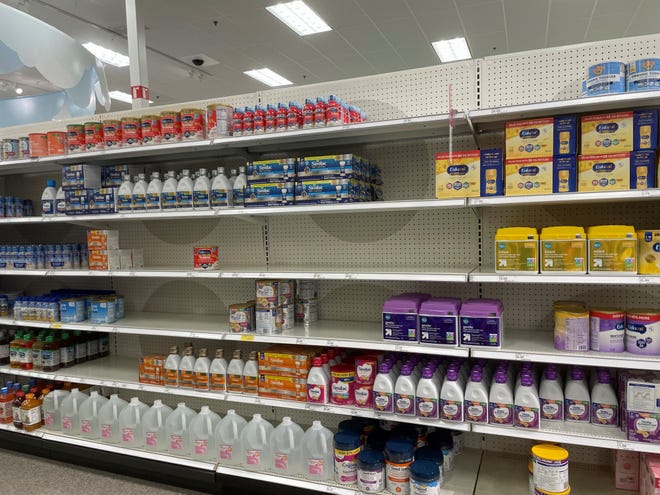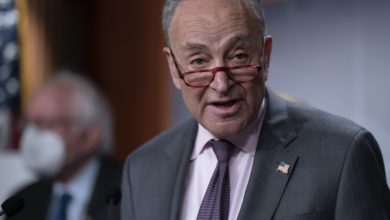
- Infant formula supplies have become more constrained, increasing out-of-stock percentage to 40% from 31% two weeks earlier.
- The shortage has led retailers including CVS, Target and Walgreens to limit purchases of infant formula.
- Shortages are even worse in some states: Tennessee, Texas, Missouri, Iowa, South Dakota and North Dakota face supply shortages higher than 50%.
The ongoing infant formula shortage isn't over yet – and appears to be getting worse.
Nearly 40% of popular baby formula brands were sold out at retailers across the U.S. during the week starting April 24, according to an analysis by Datasembly, which assessed supplies at more than 11,000 stores.
That's up from an already-high out-of-stock percentage of 31% two weeks ago, Datasembly said.
Major retailers including CVS, Target and Walgreens are limiting the amount of formula shoppers can purchase.
Walgreens continues to limit shoppers to three infant and toddler formula products per transaction, Walgreens Boots Alliance spokesman Steve Cohen said. "Due to increased demand and various supplier challenges, infant and toddler formulas are seeing constraint across the country," he said.
Mother's Day:From fastest marathon to being oldest to conceive: Mothers who set Guinness World Records
'Back at square one':Alabama police find abandoned SUV but escaped inmate, officer still missing

The situation is the same at CVS, which limits three baby formula products per purchase in its stores and online, according to a statement to USA TODAY from CVS Health, which owns the pharmacy chain. "We’re continuing to work with our baby formula vendors to address this issue and we regret any inconvenience this causes our customers," the statement continued.
Target is also limiting shoppers to up to four formula products at a time, the retailer told CBS News.
After recently visiting three different stores in one day last month, Elyssa Schmier, the vice president of government relations for advocacy group MomsRising,"all of a sudden realized my formula was nowhere to be found," she told USA TODAY. "It's almost a full-time job trying to find Similac."
Infant formula recalls worsen situation

Exacerbating the problem has been a voluntary recall Abbott Nutrition issued in mid-February recalling select batches of Similac, Alimentum and EleCare formulas made in Sturgis, Michigan. That recall was expanded in late February to include one lot of Similac PM 60/40.
Subsequently, the Food and Drug Administration in March issued preliminary findings about the formula maker's failure to maintain sanitary conditions and procedures at that plant.
The FDA continues to investigate the situation at Abbott and is "working with Abbott on safe resumption of production at the Sturgis, Michigan facility," it says in a notice about the recall on its website.
"We are aware the recall has created new concerns about the availability of certain types of infant formula, particularly given the overall strains on supply chains experienced during the COVID-19 pandemic," the FDA said. "We will continue discussion with Abbott Nutrition and other infant formula manufacturers and consider all tools available to support the supply of infant formula products."
Baby formula:Five things you can do during a formula shortage
What's everyone talking about? Sign up for our trending newsletter to get the latest news of the day
An Abbott spokesperson told The Wall Street Journal on Friday the company found that the formula made at that plant "is not likely the source of infection in the reported cases and that there was not an outbreak caused by products from the facility."
As it awaits the reopening of that plant, Abbott is trying to increase Similac production at its other plants and is shipping formula from Europe, the Journal reported.
Similarly, the maker of Enfamil has its factories running constantly to increase supply, the Reckitt Benckiser Group told the Journal.
The company has "ample supply" but baby formula sales in the U.S. are up 18%, which is "more than double" birth rates, Reckitt told CBS News.
Reckitt has "taken a number of measures – including shipping over 30% more product in Q1, running our factories 24/7 with 3 shifts per day, and rationalizing our portfolio to focus on those sizes that allow us to provide the most formula," the company said in a statement to USA TODAY. "We have also significantly increased our quality assurance resources to make sure our rigorous safety standards are maintained."
Where the formula shortage is worst
Baby formula shortages began to emerge near the end of November 2021 when about 11% of popular brands were out of stock, Datasembly said. Prior to that during most of 2021, supply was "relatively stable and (shortages) fluctuated between 2%-8%," the research firm said in its most recent report.
The recalls, supply chain shortages and inflation have affected the baby formula supply, said Datasembly CEO and founder Ben Reich in the report.
“Unfortunately, baby formula out-of-stock levels have continued to soar since the beginning of April, and we see no indication of a slow down," he said. Baby formula continues "demonstrating higher out-of-stock levels than other categories," Reich said/in an email exchange with USA TODAY.
Shortages are even worse in some states and cities.
Six states – Tennessee, Texas, Missouri, Iowa, South Dakota and North Dakota – faced supply shortages higher than 50% the week starting April 24, Datasembly said. The metro area with the highest out-of-supply rate was San Antonio, with 57%, followed by Memphis & Nashville (52%), and Des Moines & Houston (50%).
Follow Mike Snider on Twitter: @mikesnider.









